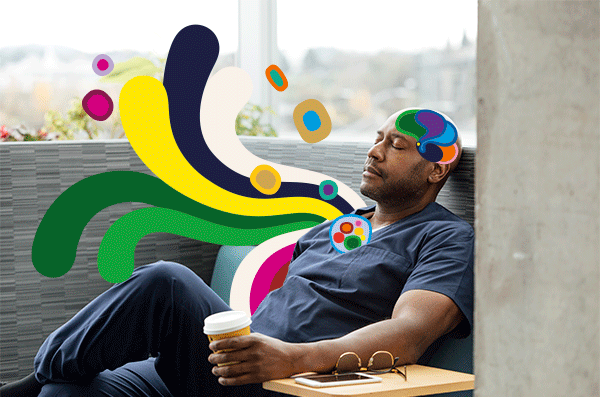Written by Medibank
Dark days, drizzling rain, a chill in the air… for many people, winter can bring with it a drop in mood, energy and motivation. Psychologist Morag Paterson from Sydney’s MindFrame Psychology explains how to feel better during the gloomier months.

Is winter depression real?
One of the main reasons is the reduced sunlight in winter, which affects our body’s circadian rhythms (internal body clocks). For example, we have a hormone called melatonin that affects how sleepy we feel. When there is less sunlight more melatonin is produced, resulting in people feeling more tired in winter. Less sunlight also reduces the production of a neurotransmitter called serotonin, which affects our mood.
Colder temperatures and longer dark hours can also affect our thoughts and behaviours. For example, there can be reduced motivation to leave your home, which means there is less socialising, reduced engagement in activities and a tendency to sleep more, which can then impact on mood and energy levels.
In winter there can be fewer opportunities for going for evening walks or playing sports outside, so often people exercise less. There is a lot of research to show exercise improves mood and is important for your mental wellbeing.
What is winter depression and the symptoms?
Seasonal Affective Disorder (SAD), also known as winter depression, is where an episode of depression is triggered by the change of season, most commonly in autumn or winter.
Symptoms of depression can vary from mild to severe. These include feeling sad or depressed most days, with a loss of interest in activities that were previously enjoyable. A common sign is feeling fatigued despite having enough sleep or sleeping too much. People with SAD may experience carbohydrate cravings, leading to overeating and weight gain. There may be symptoms of restlessness or slowed movements and speech.
Depression affects the brain’s ability to function, leading to difficulties concentrating or making decisions. It is common to have excessive feelings of guilt. People who have SAD may feel worthless and may also have thoughts of death or attempts at suicide.
If symptoms are interfering with daily functioning, impacting on your job, social life or other important areas of your life, it is advisable to seek professional support through your GP. There are treatments available to help including antidepressant medications, light therapy and Cognitive Behavioural Therapy.
Read more: Finding support

Download the Medibank Better Minds App
Want to better manage your mental health on your own terms, in your own time? Medibank’s Better Minds app provides members with hospital cover€ access to interactive wellness checks, evidence based skills training and confidential one-on-one coaching. Find out more.
How to avoid winter depression
Daylight
Since a reduction in the lightness is one of the key problems, it is important to access daylight and sun whenever possible. Ensure curtains and blinds are open in daylight and take walks in the sun.
Exercise
Exercise releases the feel good-chemical of serotonin in the brain. It can also give you a sense of achievement and feelings of belonging and connection through engaging with others.
The best way to engage in regular exercise is for it to become a fixed part of your routine. Set in your mind the days and times that you will exercise and consistently stick to this. It can be harder to find motivation to exercise during winter, so reflect on the benefits it gives you and set yourself some realistic goals.
Pleasurable activities
Often when people are depressed they avoid doing activities, but activities can give you a sense of enjoyment, pleasure and satisfaction. Engage in hobbies or do things that make you feel good. Listen to music, or watch your favourite comedies, movies or TV shows. Set yourself little goals to achieve – clear out a cupboard, look at old photos, go somewhere new, go to the movies.
Socialising
Link up with old friends, make new friends or invest in your current friendships.
Sleep
Try to get the amount of sleep that you need to have to a good sense of wellbeing (typically 6-8 hours). This may mean changing some habits – like going to bed on time and not oversleeping.
Healthy food
Have a healthy balanced diet, focusing on fruits, vegetables, omega-3-rich foods, proteins and complex carbohydrates, and drink lots of water. Complex carbohydrates (like green vegetables, wholegrains and beans) contain soluble fibre, which slows the absorption of sugar into the bloodstream and increases serotonin levels, helping boost your mood.
Limit sugary foods, as they only give short-lived bursts of energy and are often followed by groggy feelings.
Related articles
Things you need to know
~ Some referred services may involve out of pocket costs and waiting periods may apply.
While we hope you find this information helpful, please note that it is general in nature. It is not health advice, and is not tailored to meet your individual health needs. You should always consult a trusted health professional before making decisions about your health care. While we have prepared the information carefully, we can’t guarantee that it is accurate, complete or up-to-date. And while we may mention goods or services provided by others, we aren’t specifically endorsing them and can’t accept responsibility for them. For these reasons we are unable to accept responsibility for any loss that may be sustained from acting on this information (subject to applicable consumer guarantees).












